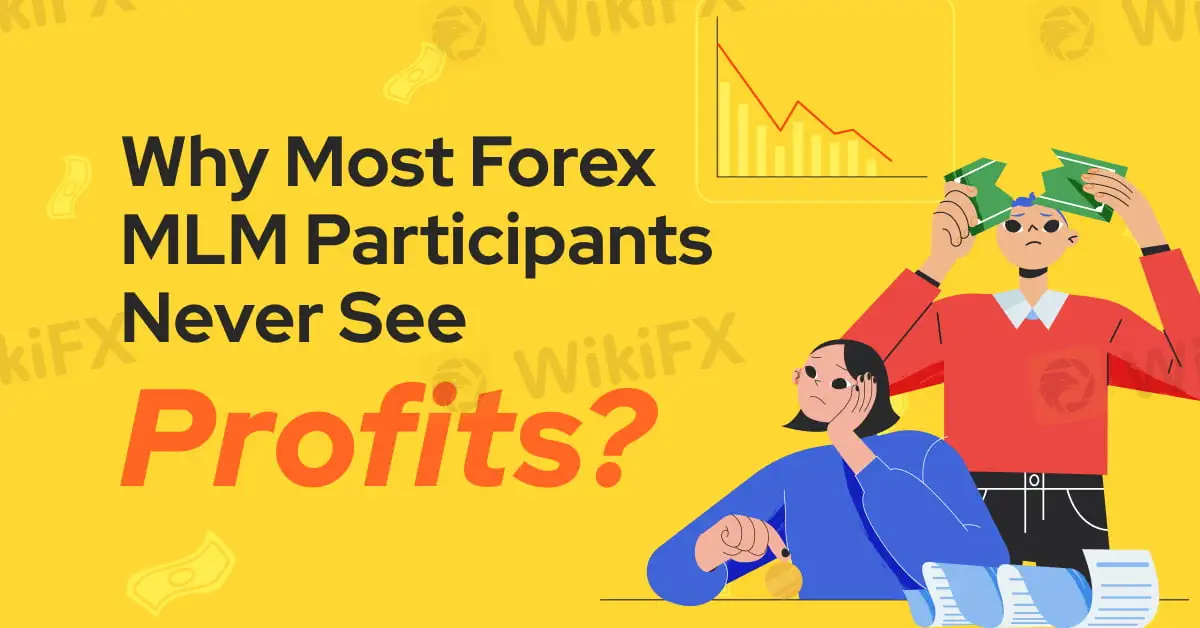简体中文
繁體中文
English
Pусский
日本語
ภาษาไทย
Tiếng Việt
Bahasa Indonesia
Español
हिन्दी
Filippiiniläinen
Français
Deutsch
Português
Türkçe
한국어
العربية
Why Most Forex MLM Participants Never See Profits?
Abstract:Forex-related MLMs have garnered significant attention, often for the wrong reasons. These Multi-Level Marketing (MLM) schemes typically promise participants substantial profits through foreign exchange (forex) trading, but the reality is often quite different. Here's a closer look at the phenomenon:

Forex-related MLMs have garnered significant attention, often for the wrong reasons. These Multi-Level Marketing (MLM) schemes typically promise participants substantial profits through foreign exchange (forex) trading, but the reality is often quite different. Here's a closer look at the phenomenon:

Forex-related MLMs operate on a classic pyramid scheme model, where participants earn commissions not only from their own trading but also from recruiting others into the program. In theory, this creates a lucrative income stream for those at the top. However, the vast majority of participants, especially those at the bottom of the pyramid, struggle to make any significant profits. This structure encourages aggressive recruitment over actual trading success.

One of the hallmarks of forex-related MLMs is their tendency to make exaggerated claims about the potential for profit. They often showcase testimonials from top earners, flaunt luxurious lifestyles, and use high-pressure sales tactics to convince newcomers that they can achieve similar success. In reality, most members do not see the promised returns and are left with little to show for their investments.

Forex-related MLMs often rebrand themselves regularly in response to increasing scrutiny from regulators and negative media coverage. The rebranding efforts often include tweaking their marketing strategies and product offerings to avoid legal repercussions. However, the core business model remains largely the same, with an emphasis on recruitment over actual forex trading education.

Forex-related MLMs have faced numerous investigations and legal challenges from regulatory bodies. The U.S. Commodity Futures Trading Commission (CFTC) and other international regulators have scrutinized these companies for misleading practices and the unrealistic promises made to participants. Despite these challenges, many such companies continue to operate, often shifting focus to regions with less stringent regulatory oversight.

For most participants, joining a forex-related MLM results in financial loss rather than gain. The complex compensation structures, high costs of entry, and the need to recruit constantly create an environment where only a small percentage of individuals, usually those at the very top, see any real profits. The majority, lured by the promise of easy money, often end up disillusioned and financially worse off than when they started.
Forex-related MLMs represent a troubling trend in the financial world. While they claim to offer education and opportunities in forex trading, their true focus lies in recruitment and the perpetuation of a pyramid-like structure. Potential participants should exercise caution, thoroughly research these schemes, and be aware of the high likelihood of financial loss.

Disclaimer:
The views in this article only represent the author's personal views, and do not constitute investment advice on this platform. This platform does not guarantee the accuracy, completeness and timeliness of the information in the article, and will not be liable for any loss caused by the use of or reliance on the information in the article.
Read more

Big News! UK 30-Year Bond Yields Soar to 25-Year High!
Following the successful auction of 30-year government bonds by the UK, the yield on 30-year bonds surged, reaching its highest level in 25 years. This increase reflects growing concerns in the market over the government's fiscal policies and large-scale debt issuance.

Beware of Fraudulent Letters: Malaysia’s Securities Commission Issues Warning
The Securities Commission Malaysia (SC) has raised an alarm over fraudulent letters and emails falsely claiming to be from the regulatory body. These fake communications are allegedly tied to illicit investment schemes that seek payments from unsuspecting investors.

Singapore’s New Law Allows Police to Freeze Scam Victims’ Bank Accounts
Singapore has enacted a new law enabling police to freeze bank accounts of scam victims as a last-resort measure to prevent financial losses.

Rising U.S. Corporate Bankruptcies Deepen Economic Concerns
In 2024, 686 U.S. companies filed for bankruptcy, marking the highest number since 2010.
WikiFX Broker
Latest News
Attention! Goldman Sachs Cuts Gold Target to $2910
Inflation Rebounds: ECB's Big Rate Cut Now Unlikely
Carney \considering\ entering race to replace Canada\s Trudeau
High-Potential Investments: Top 10 Stocks to Watch in 2025
US Dollar Insights: Key FX Trends You Need to Know
Why Is Nvidia Making Headlines Everywhere Today?
Discover How Your Trading Personality Shapes Success
FINRA Charges UBS $1.1 Million for a Decade of False Trade Confirmations
Pepperstone Sponsored the "Aston Martin Aramco Formula One Team"
ACY Securities Integrates MetaTrader 5 to Enhnace Copy Trading Service
Currency Calculator






